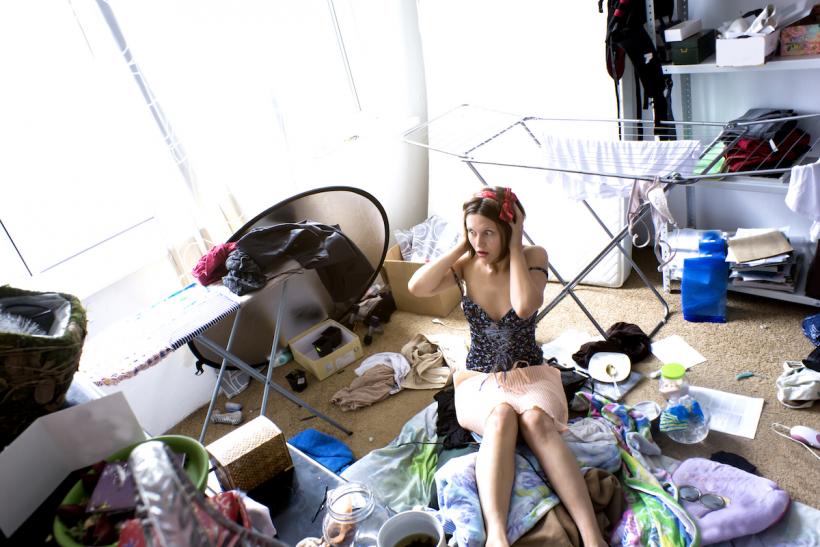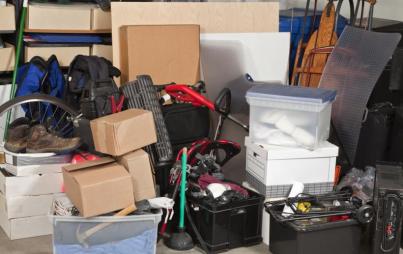
"I’m definitely what I generally refer to as a reformed messy person."
My sister and I bond over our love for clean, minimalistic IKEA spreads as well as our general inability to get our shit together in our respective living situations. I’ve read countless books and websites over the years to help me get more organized, declutter, tidy up, whatever . . . But it’s Rachel Hoffman’s “Unf*ck Your Habitat” approach that speaks to me most, and not just because she likes swearing as much as I do.
She advocates daily cleaning habits in small, doable bursts, and embracing housekeeping as an ongoing practice rather than a perfect magazine spread end goal (sorry, IKEA).
I chatted with Rachel about her recent book while pacing around my house, weaving around the fake Christmas tree that’s still up. In March.
Q:I really loved Unf*ck Your Habitat: You're Better Than Your Mess. My sister and I have followed the blog for a long time . . . What was your journey to starting it in the first place?
A: Well, I’m definitely what I generally refer to as a reformed messy person. I feel like a lot of these books and systems and everything are done by people who are very naturally neat and very naturally tidy and clean. So it started out as me yelling at people to get up and do what they have to do, and it sort of morphed from there, turned into something a little bit different. It’s a lot less mean than it used to be.
Q: One thing that my sister and I were talking about the other night — we’re both very messy people, and not reformed, unfortunately, we’re in the process of reforming . . .
A: And reforming is a long journey, trust me.
Q: Right. But we talked about a couple of other approaches, like the Fly Lady, for example, feel very traditional — even the name kind of implies that it’s a lady’s job to be doing this. And so another thing I really liked about your book was that you have these sections about some of the social constructs around cleaning in general.
A: The very first thing I like to do is take that assumption of, okay, it’s a woman’s job, and throw that out the window, because everybody who lives in a space should be responsible for that space.
And I think it does everybody a disservice if we’re saying okay, you’re a man, so you don’t have to worry about this. It’s bullshit. And then as far as the other kinds of people who have felt left behind by these systems before — you know, people who do have disabilities or invisible illnesses or mental illness — those things are a very real part of somebody’s life and they affect how they’re able to interact with cleaning, and how they’re able to interact with their home.
Q: I really did have a moment when I was reading your book when it occurred to me for the first time that some of the way that I am around cleaning is not totally my fault. Not that it’s not my fault, per se, but just that there are factors at play with the way that I cleaned when I was a kid and the way my parents taught me about cleaning and that kind of thing.
A: Well, I think that parents have to just be very aware of how they’re presenting household chores. I hear from so many people that it was a punishment, or if you didn’t do it right you were punished, or there’s a lot of negativity associated with cleaning as a child. I think just presenting it as a little more straightforward — these are things that we do, these are things that have to get done — and wrap these up as part of the everyday life rather than part of a giant project.
Q: You also talk about what people can do if their living situation is untenable, but maybe they can’t really move because they can’t afford to or whatever. So in those situations, what is it that you recommend that people do to try to make it work?
A: Generally, if you’re living with other people, you have at least one type of space that’s just for you alone. Just to be able to exert some control over that one space helps you ease up on the rest of it.
It can be very difficult. There are a lot of nightmare roommates, and sometimes those roommates are related to you somehow, which is not the best situation. I always advocate communication. You need to communicate with the people you’re living with, and early is always better because if you can address some of the stuff before it has the chance to get really bad, that gives you a little bit more of a framework to work within and you’re not bringing a ton of emotion into it. By the time things are very very bad, you’re usually angry; you can get passive-aggressive.
Q: When I read The Life-Changing Magic of Tidying Up . . . it’s a very lovely book, as far as it has an ethos that matches her minimalistic approach. At the same time, one thing that was kind of frustrating is that — you know, I’m married, I have two kids — so my situation is not just me. And her approach to that was that, if you clean, then other people will naturally follow. And I was like, well . . .
A: I don’t know that that’s true.
Q: Right. I was like, well, I don’t know, I feel like I’ve been trying to do it and I don’t see anybody following . . . So that can be one of the most frustrating things about cleaning, I think, is when you don’t have complete control of it.
A: And I think understanding, too, that people aren’t going to be at the same place that you are with it. They don’t have the same motivation that you do, so it’s certainly not unreasonable to say, “Hey, can you help me out with XYZ,” or “would you mind taking the trash out,” or whatever. Especially when you’re dealing with other people, having very specific kinds of requests like that, rather than “Why don’t you ever help me clean up this mess?,” which is very general and broad and people get frustrated by it.
Q: Of all the cleaning programs out there, is there a particular narrative about cleaning that you wish people wouldn’t fall into?
A: There’s a lot of emphasis on perfection and on being complete in your cleaning, and I think it’s very rigid and I think that what scares a lot of people off is this sort of, “Well, if I have to do everything top to bottom and it has to look like a magazine ad then I know I’m not going to be able to do that so why even try.”
And people just don’t embrace good enough as much as they should.
Q: I appreciate that you talk in your book about the money aspect of it, and if you look at these IKEA spreads and it all looks beautiful and it’s all perfectly organized . . .
A: It’s expensive!
Q: It’s so expensive. You start looking at all these matching baskets . . . Especially now, because we have Pinterest and beautiful Instagram posts of organization and whatever, but I do think that we tend to get that way where we’re like, “I want mine to look like that, and it doesn’t look like that.”
A: You know, it’s aspiration versus expectation.
It’s great to be inspired, and it’s great to enjoy the aesthetics of something, but you also want to be able to look around where you are and say, "Hey, I really like this, too. It may not look like a magazine spread but it’s my house and I’m comfortable here."
There’s a lot of value in that.








